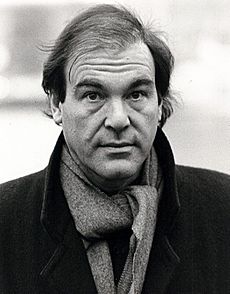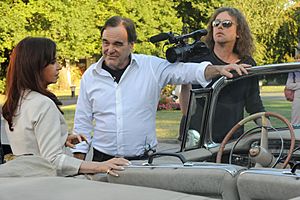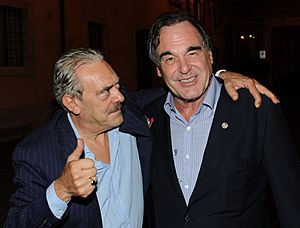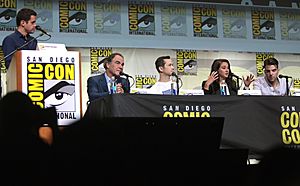Oliver Stone facts for kids
Quick facts for kids
Oliver Stone
|
|
|---|---|
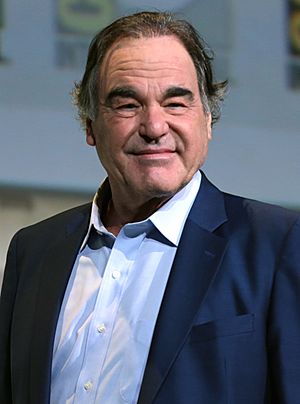
Stone in 2016
|
|
| Born |
William Oliver Stone
September 15, 1946 New York City, U.S.
|
| Alma mater | Yale University New York University (BFA) |
| Occupation |
|
| Years active | 1971–present |
| Spouse(s) |
|
| Children | 3, including Sean Stone |
| Awards | Full list |
| Military career | |
| Allegiance | United States |
| Service/ |
|
| Years of service | 1966 (Merchant Marine) 1967–1973 (Army) |
| Unit | |
| Battles/wars | Vietnam War |
William Oliver Stone (born September 15, 1946) is an American film director, producer, and screenwriter. Stone is known as a controversial but acclaimed director, tackling subjects ranging from the Vietnam war, and American politics to musical biopics and crime dramas. He has received numerous accolades including four Academy Awards, a BAFTA Award, a Primetime Emmy Award, and five Golden Globe Awards.
Stone was born in New York City and later briefly attended Yale University. In 1967, Stone enlisted in the United States Army during the Vietnam war. He then served from 1967 to 1968 in the 25th Infantry Division and was twice wounded in action. For his service, he received military honors such as the Bronze Star with "V" Device for valor, the Purple Heart with Oak Leaf Cluster, the National Defense Service Medal, the Vietnam Service Medal with one Silver Service Star. His service in Vietnam would be the basis for his later career as a filmmaker in depicting the brutality of war.
Stone started his film career writing the screenplays for Midnight Express (1978), for which he won the Academy Award for Best Adapted Screenplay, Conan the Barbarian (1982), and Scarface (1983). He then rose to prominence as writer and director of the Vietnam war film drama Platoon (1986), and Born on the Fourth of July (1989) for which he received Academy Awards for Best Director and Best Picture for the former and Best Director for the latter. He also directed Salvador (1986), Wall Street (1987) and its sequel Wall Street: Money Never Sleeps (2010), The Doors (1991), JFK (1991), Heaven & Earth (1993), Natural Born Killers (1994), Nixon (1995), Any Given Sunday (1999), W. (2008), and Snowden (2016).
Many of Stone's films focus on controversial American political issues during the late 20th century, and as such were considered contentious at the times of their releases. Stone has been critical of American foreign policy, which he considers to be driven by nationalist and imperialist agendas. He has approved of politicians Hugo Chávez and Vladimir Putin, the latter of whom was the subject of The Putin Interviews (2017). Like his subject matter, Stone is a controversial figure in American filmmaking.
Contents
Early life
Stone was born in New York City, the son of a French woman named Jacqueline (née Goddet) and Louis Stone (born Louis Silverstein), a stockbroker. He grew up in Manhattan and Stamford, Connecticut. His parents met during World War II, when his father was fighting as a part of the Allied force in France. Stone's American-born father was Jewish, whereas his French-born mother was Roman Catholic, both non-practicing. Stone was raised in the Episcopal Church, and now practices Buddhism.
Stone attended Trinity School in New York City before his parents sent him away to The Hill School, a college-preparatory school in Pottstown, Pennsylvania. His parents divorced abruptly while he was away at school (1962) and this, because he was an only child, marked him deeply. Stone's mother was often absent and his father made a big impact on his life—perhaps because of this, father-son relationships feature heavily in Stone's films.
He often spent parts of his summer vacations with his maternal grandparents in France, both in Paris and La Ferté-sous-Jouarre in Seine-et-Marne. Stone also worked at 17 in the Paris mercantile exchange in sugar and cocoa – a job that proved inspirational to Stone for his film Wall Street. He speaks French fluently. Stone graduated from The Hill School in 1964.
Stone was admitted to Yale University but left in June 1965 at age 18 to teach high school students English for six months in Saigon at the Free Pacific Institute in South Vietnam. Afterwards, he worked for a short while as a wiper on a United States Merchant Marine ship in 1966, traveling from Asia to Oregon across the rough Pacific Ocean in January. He returned to Yale, where he dropped out a second time (in part due to working on an autobiographical novel, "A Child's Night Dream," published in 1997 by St. Martin's Press).
U.S. Army
In April 1967, Stone enlisted in the United States Army and requested combat duty in Vietnam. From September 27, 1967, to February 23, 1968, he served in Vietnam with 2nd Platoon, B Company, 3rd Battalion, 22nd Infantry Regiment, 25th Infantry Division and was twice wounded in action. He was then transferred to the 1st Cavalry Division participating in long-range reconnaissance patrols before being transferred again to drive for a motorized infantry unit of the division until November 1968. For his service, his military awards include the Bronze Star with "V" Device for valor, the Purple Heart with Oak Leaf Cluster to denote two awards, the Air Medal, the Army Commendation Medal, Sharpshooter Badge with Rifle Bar, Marksman Badge with Auto Rifle Bar, the National Defense Service Medal, the Vietnam Service Medal with one Silver Service Star, the Republic of Vietnam Gallantry Cross with Unit Citation with Palm, two Overseas Service Bars, the Vietnam Campaign Medal and the Combat Infantryman Badge.
Awards and honors
(while with the U.S. Army)
 |
|
|
Writing and directing career
1970s
Stone graduated from New York University with a Bachelor of Fine Arts degree in film in 1971, where his teachers included director and fellow NYU alumnus Martin Scorsese. The same year, he had a small acting role in the comedy The Battle of Love's Return. Stone made a short, well received 12-minute film Last Year in Viet Nam. He worked as a taxi driver, film production assistant, messenger, and salesman before making his mark in film as a screenwriter in the late 1970s, in the period between his first two films as a director: horror films Seizure and The Hand.
In 1979, Stone was awarded his first Oscar, after adapting true-life prison story Midnight Express into the successful film of the same name for British director Alan Parker (the two men would later collaborate on the 1996 movie of stage musical Evita). The original author, Billy Hayes, around whom the film is set, said the film's depiction of prison conditions was accurate. Stone later apologized to Turkey for over-dramatizing the script, while standing by the film's stark brutality of Turkish prisons.
1980s
Stone wrote further features, including Brian De Palma's epic Scarface. He also penned Year of the Dragon (co-written with Michael Cimino) featuring Mickey Rourke, before his career took off as a writer-director in 1986. Like his contemporary Michael Mann, Stone is unusual in having written or co-written most of the films he has directed. In 1986, Stone directed two films back to back: the critically acclaimed but commercially unsuccessful Salvador, shot largely in Mexico, and his long in-development Vietnam project Platoon, shot in the Philippines.
Platoon brought Stone's name to a much wider audience. It also finally kickstarted a busy directing career, which saw him making nine films over the next decade. Alongside some negative reaction, Platoon won many rave reviews (Roger Ebert later called it the ninth best film of the 1980s), large audiences, and Academy Awards for Best Picture and Best Director. In 2007, a film industry vote ranked it at number 83 in an American Film Institute "AFI's 100 Years ... 100 Movies" poll of the previous century's best American movies. British TV channel Channel 4 voted Platoon as the sixth greatest war film ever made. In 2019, Platoon was selected by the Library of Congress for preservation in the United States National Film Registry for being "culturally, historically, or aesthetically significant".
Platoon was the first of three films Stone has made about the Vietnam War: the others were Born on the Fourth of July and Heaven & Earth, each dealing with different aspects of the war. Platoon is a semi-autobiographical film about Stone's experience in combat; Born on the Fourth of July is based on the autobiography of US Marine turned peace campaigner Ron Kovic; Heaven & Earth is based on the memoir When Heaven and Earth Changed Places, in which Le Ly Hayslip recalls her life as a Vietnamese village girl drastically affected by the war and who finds another life in the USA.
Stone also directed Wall Street, which was released in December 1987. Lead performer Michael Douglas received an Academy Award for Best Actor for his role as a ruthless Wall Street corporate raider, and Talk Radio, based on Eric Bogosian's Pulitzer-nominated play.
1990s
The Doors, released in 1991, received criticism from former Doors keyboardist Ray Manzarek during a question and answer session at Indiana University East in 1997. During the discussion, Manzarek stated that he sat down with Stone about the Doors and Jim Morrison for over 12 hours. Patricia Kennealy-Morrison—a rock critic and author—was a consultant on the movie, in which she makes a cameo appearance, but she writes in her memoir Strange Days: My Life With and Without Jim Morrison (Dutton, 1992) that Stone ignored everything she told him and proceeded with his own version of events. From the moment the movie was released, she blasted it as untruthful and inaccurate. The other surviving former members of the band, John Densmore and Robby Krieger, also cooperated with the filming of Doors, but Krieger distanced himself from the work before the film's release. However, Densmore thought highly of the film, and in fact celebrated its DVD release on a panel with Oliver Stone.
During this same period, Stone directed one of his most ambitious, controversial and successful films: JFK, depicting the assassination of John F. Kennedy on November 22, 1963. In 1991, Stone showed JFK to Congress on Capitol Hill, which helped lead to passage of the Assassination Materials Disclosure Act of 1992.
Stone went on to direct the 1995 Richard Nixon biopic Nixon, which received multiple Oscar nominations for script, John Williams' score, Joan Allen as Pat Nixon and Anthony Hopkins' portrait of the title role. Stone followed Nixon with the 1997 road movie/film noir, U Turn, and 1999's Any Given Sunday, a film about power struggles within and without an American football team.
2000s
After a period from 1986 to 1999, where he released a new film at least every 1–2 years, Stone slowed down in the 2000s, though still finding some success.
In 2004, Stone directed Alexander. He later re-edited his biographical film of Alexander the Great into a two-part, 3-hour 37-minute film Alexander Revisited: The Final Cut, which became one of the highest-selling catalog items from Warner Bros. He further refined the film and in 2014 released the two-part, 3-hour 26-minute Alexander: The Ultimate Cut. After Alexander, Stone went on to direct World Trade Center, based on the true story of two PAPD policemen who were trapped in the rubble and survived the September 11 attacks.
Stone wrote and directed the George W. Bush biopic W., chronicling the former President's childhood, relationship with his father, personal struggles, rediscovery of his Christian faith, and continues the rest of his life up to the 2003 invasion of Iraq.
2010s
In 2010, Stone returned to the theme of Wall Street for the sequel Wall Street: Money Never Sleeps. In 2012, Stone directed Savages, based on a novel by Don Winslow.
In 2016, Stone directed Snowden, starring Joseph Gordon-Levitt as whistleblower Edward Snowden. The film received mixed reviews from critics and was not a commercial success. As of 2025, it remains Stone's final narrative feature film.
On May 22, 2017, various industry papers reported that Stone was going to direct a television series about the Guantanamo detention camp. Daniel Voll was credited with creating the series. Harvey Weinstein's production company is financing the series. It was reported that Stone was scheduled to direct every episode of the first season. However, Stone announced he would quit the series after allegations surfaced against Weinstein in October 2017.
2020s
In 2020, Stone announced his semi-retirement from film-making, though he still occasionally makes documentaries.
In July 2020, Stone teamed with Houghton Mifflin Harcourt to release his first memoir, titled Chasing the Light: Writing, Directing, and Surviving Platoon, Midnight Express, Scarface, Salvador, and the Movie Game, which chronicles his turbulent upbringing in New York City, volunteering for combat in Vietnam, and the trials and triumphs of moviemaking in the 1970s and '80s. The book, which ends on his Oscar-winning Platoon, was praised by The New York Times: "The Oliver Stone depicted in these pages — vulnerable, introspective, stubbornly tenacious and frequently heartbroken—may just be the most sympathetic character he's ever written... neatly sets the stage for the possibility of that rarest of Stone productions: a sequel."
Documentaries
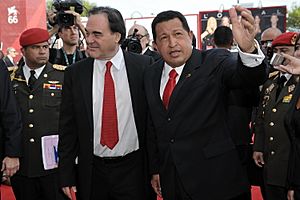
Stone made three documentaries on Fidel Castro: Comandante (2003), Looking for Fidel, and Castro in Winter (2012). He made Persona Non Grata, a documentary on Israeli-Palestinian relations, interviewing several notable figures of Israel, including Ehud Barak, Benjamin Netanyahu, and Shimon Peres, as well as Yasser Arafat, leader of the Palestine Liberation Organization.
In 2009, Stone completed a feature-length documentary, South of the Border about the rise of leftist governments in Latin America, featuring seven presidents: Hugo Chávez of Venezuela, Bolivia's Evo Morales, Ecuador's Rafael Correa, Cuba's Raúl Castro, the Kirchners of Argentina, Brazil's Lula da Silva, and Paraguay's Fernando Lugo, all of whom are critical of US foreign policy in South America. Stone hoped the film would get the rest of the Western world to rethink socialist policies in South America, particularly as it was being applied by Venezuela's Hugo Chávez. Chávez joined Stone for the premiere of the documentary at the Venice International Film Festival in September 2009. Stone defended his decision not to interview Chávez's opponents, stating that oppositional statements and TV clips were scattered through the documentary and that the documentary was an attempt to right a balance of heavily negative coverage. He praised Chávez as a leader of the Bolivarian Revolution, a movement for social transformation in Latin America, and also praised the six other presidents in the film. The documentary was also released in several cities in the United States and Europe in the mid-2010.
In 2012, the documentary miniseries Oliver Stone's Untold History of the United States premiered on Showtime, Stone co-wrote, directed, produced, and narrated the series, having worked on it since 2008 with co-writers American University historian Peter J. Kuznick and British screenwriter Matt Graham. The 10-part series is supplemented by a 750-page companion book of the same name, also written by Stone and Kuznick, published on October 30, 2012, by Simon & Schuster. Stone described the project as "the most ambitious thing I've ever done. Certainly in documentary form, and perhaps in fiction, feature form." The project received positive reviews from former Soviet leader Mikhail Gorbachev, The Guardian journalist Glenn Greenwald, and reviewers from IndieWire, San Francisco Chronicle, and Newsday.
Stone was interviewed in Boris Malagurski's documentary film The Weight of Chains 2 (2014), which deals with neoliberal reforms in the Balkans.
On March 5, 2014, Stone and teleSUR premiered the documentary film Mi amigo Hugo (My Friend Hugo), a documentary about Venezuela's late President, Hugo Chávez, one year after his death. The film was described by Stone as a "spiritual answer" and tribute to Chávez. At the end of 2014 according to a Facebook post Stone said he had been in Moscow to interview (former Ukrainian president) Viktor Yanukovych, for a "new English language documentary produced by Ukrainians".
Two years later in 2016, Stone was executive producer for Ukrainian-born director Igor Lopatonok's film Ukraine on Fire, a documentary written by Vanessa Dean. In the film, Lopatonok showed the historic background of divisions in the region; Stone interviewed ousted president Yanukovych and Russian president Vladimir Putin about the removal of Yanukovych in the 2014 Maidan Revolution. Narratives in the film such as by the late investigative journalist Robert Parry described the rise of US-funded NGOs active in the area and suggested that the Maidan Revolution was a US-backed coup d'état.
Stone's series of interviews with Russian president Putin over the span of two years was released as The Putin Interviews, a four-night television event on Showtime on June 12, 2017. On June 13, Stone and Professor Stephen F. Cohen joined John Batchelor in New York to record an hour of commentary on The Putin Interviews.
In June 2021, Stone's documentary JFK Revisited: Through the Looking Glass was selected to be shown in the Cannes Premiere section at the 2021 Cannes Film Festival.
In 2021, he also produced and featured in Qazaq: History of the Golden Man, directed by Lopatonok, an eight-hour film consisting of Stone interviewing Kazakh politician and former leader Nursultan Nazarbayev. The movie has been criticized for its non-confrontational approach in the interview and because no opposition members were interviewed, according to some critics this resulted in a promotion of the authoritarian rule and cult of personality of Nazarbayev. The film received at least $5 million funding from Nazarbayev's own charitable foundation, Elbasy, via the country's State Center for Support of National Cinema, according to the Organized Crime and Corruption Reporting Project. Stone and Lopatonok had denied any Kazakhstani government involvement. According to Rolling Stone, "What little attention Qazaq did receive was largely negative, with critics decrying the film for its glowing depiction of Nazarbayev."
Other work
In November 1997, Stone won an episode of the game show Jeopardy! during "Power Players" theme week, playing on behalf of charity Rock the Vote. As of 2025, that makes him one of only three Academy Award winners who have also won Jeopardy!
On September 15, 2008, Stone was named the artistic director of New York University's Tisch School of the Arts Asia in Singapore.
Stone contributed a chapter to the 2012 book Last Word: My Indictment of the CIA in the Murder of JFK by Mark Lane and published by Skyhorse Publishing. Skyhorse has published numerous other books with forewords or an introduction by Stone, namely The JFK Assassination, Reclaiming Parkland: Tom Hanks, Vincent Bugliosi, and the JFK Assassination in the New Hollywood, The Plot to Overthrow Venezuela: How the US is orchestrating a coup for oil, Snowden:The Official Motion Picture Edition, The Putin Interviews and JFK: The CIA, Vietnam, and the Plot to Assassinate John F. Kennedy which features a quote from Stone on the newest edition's cover: "Blows the lid right off our 'Official History.'"
In 2022, he appeared in Theaters of War, discussing the role of the military in Hollywood.
Directorial style
Many of Stone's films focus on controversial American political issues during the late 20th century, and as such were considered contentious at the times of their releases. They often combine different camera and film formats within a single scene, as demonstrated in JFK (1991), Natural Born Killers (1994), and Nixon (1995).
Influences
Stone listed Greek-French director Costa-Gavras as an early significant influence on his films. Stone mentioned that he "was certainly one of my earliest role models,...I was a film student at NYU when Z came out, which we studied. Costa actually came over with Yves Montand for a screening and was such a hero to us. He was in the tradition of Gillo Pontecorvo's The Battle of Algiers and was the man in that moment... it was a European moment."
Personal life
Family
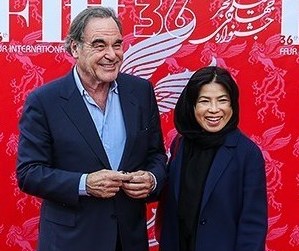
Stone has been married three times, first to Najwa Sarkis on May 22, 1971. They divorced in 1977. He then married Elizabeth Burkit Cox, an assistant in film production, on June 7, 1981. They had two sons, Sean Stone/Ali (b. 1984) and Michael Jack (b. 1991). Sean appeared in some of his father's films while a child. Sean Stone has worked for the Russia state media company RT America since 2015. Oliver and Elizabeth divorced in 1993. Stone is now married to Sun-jung Jung from South Korea, and the couple have a daughter, Tara (b. 1995). Stone and Sun-jung live in Los Angeles.
Religion and humanism
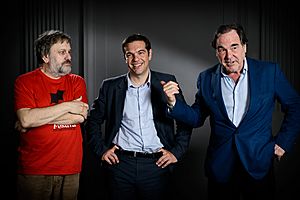
Stone is mentioned in Pulitzer Prize-winning American author Lawrence Wright's book Going Clear: Scientology, Hollywood, and the Prison of Belief as having been a member of Scientology for about a month, saying "It was like going to college and reading Dale Carnegie, something you do to find yourself." In 1997, Stone was one of 34 celebrities to sign an open letter to then-German Chancellor Helmut Kohl, published as a newspaper advertisement in the International Herald Tribune, which protested against the treatment of Scientologists in Germany and compared it to the Nazis' oppression of Jews in the 1930s. In 2003, Stone was a signatory of the third Humanist Manifesto.
Filmography
Film
| Year | Title | Director | Writer | Producer | Notes |
|---|---|---|---|---|---|
| 1973 | Sugar Cookies | No | No | Associate | |
| 1974 | Seizure | Yes | Yes | No | Also editor |
| 1978 | Midnight Express | No | Yes | No | |
| 1981 | The Hand | Yes | Yes | No | |
| 1982 | Conan the Barbarian | No | Yes | No | |
| 1983 | Scarface | No | Yes | No | |
| 1985 | Year of the Dragon | No | Yes | No | |
| 1986 | Salvador | Yes | Yes | Yes | |
| 8 Million Ways to Die | No | Yes | No | ||
| Platoon | Yes | Yes | No | ||
| 1987 | Wall Street | Yes | Yes | No | |
| 1988 | Talk Radio | Yes | Yes | No | |
| 1989 | Born on the Fourth of July | Yes | Yes | Yes | |
| 1990 | Blue Steel | No | No | Yes | |
| Reversal of Fortune | No | No | Yes | ||
| 1991 | The Doors | Yes | Yes | No | |
| Iron Maze | No | No | Executive | ||
| JFK | Yes | Yes | Yes | ||
| 1992 | Zebrahead | No | No | Executive | |
| South Central | No | No | Executive | ||
| 1993 | The Joy Luck Club | No | No | Executive | |
| Heaven & Earth | Yes | Yes | Yes | ||
| 1994 | Natural Born Killers | Yes | Yes | No | |
| The New Age | No | No | Executive | ||
| 1995 | Killer: A Journal of Murder | No | No | Executive | |
| Gravesend | No | No | No | Presenter | |
| Nixon | Yes | Yes | Yes | ||
| 1996 | Freeway | No | No | Executive | |
| The People vs. Larry Flynt | No | No | Executive | ||
| Evita | No | Yes | No | ||
| 1997 | U Turn | Yes | Uncredited | No | |
| Cold Around the Heart | No | No | Executive | ||
| 1998 | The Last Days of Kennedy and King | No | No | Executive | Documentary |
| Savior | No | No | Yes | ||
| 1999 | The Corruptor | No | No | Executive | |
| Any Given Sunday | Yes | Yes | Executive | ||
| 2003 | Comandante | Yes | Yes | Yes | Documentary, also narrator |
| 2004 | Alexander | Yes | Yes | No | |
| 2006 | World Trade Center | Yes | No | No | |
| 2008 | W. | Yes | No | No | |
| 2009 | South of the Border | Yes | No | No | Documentary |
| 2010 | Wall Street: Money Never Sleeps | Yes | No | Uncredited | |
| 2012 | Castro in Winter | Yes | No | No | Documentary |
| Savages | Yes | Yes | No | ||
| 2014 | Mi amigo Hugo | Yes | No | No | Documentary |
| 2015 | A Good American | No | No | Executive | Documentary |
| 2016 | Ukraine on Fire | No | No | Executive | Documentary |
| Snowden | Yes | Yes | No | ||
| All Governments Lie | No | No | Executive | Documentary | |
| 2019 | Revealing Ukraine | No | No | Executive | Documentary |
| 2021 | JFK Revisited: Through the Looking Glass | Yes | Yes | No | Documentary |
| Qazaq: History of the Golden Man | No | No | Executive | Documentary | |
| 2022 | Nuclear Now | Yes | Yes | No | Documentary |
Television
| Year | Title | Director | Writer | Producer | Notes |
|---|---|---|---|---|---|
| 1993 | Wild Palms | No | No | Executive | TV Mini-Series |
| 1995 | Indictment: The McMartin Trial | No | No | Executive | TV movie |
| 2001 | The Day Reagan Was Shot | No | No | Executive | |
| 2003–2004 | America Undercover | Yes | Yes | No | Episodes Looking for Fidel and Persona Non Grata |
| 2012–2013 | The Untold History of the United States | Yes | Yes | Executive | TV series documentary |
| 2017 | The Putin Interviews | Yes | Yes | Yes | |
| 2021 | JFK: Destiny Betrayed | Yes | No | No |
Awards and honors
| Year | Title | Academy Awards | BAFTA Awards | Golden Globe Awards | Golden Raspberry Awards | ||||
|---|---|---|---|---|---|---|---|---|---|
| Nominations | Wins | Nominations | Wins | Nominations | Wins | Nominations | Wins | ||
| 1986 | Salvador | 2 | |||||||
| Platoon | 8 | 4 | 3 | 2 | 4 | 3 | |||
| 1987 | Wall Street | 1 | 1 | 1 | 1 | 1 | 1 | ||
| 1989 | Born on the Fourth of July | 8 | 2 | 2 | 5 | 4 | |||
| 1991 | JFK | 8 | 2 | 4 | 2 | 4 | 1 | ||
| 1993 | Heaven & Earth | 1 | 1 | ||||||
| 1994 | Natural Born Killers | 1 | |||||||
| 1995 | Nixon | 4 | 1 | 1 | |||||
| 1997 | U Turn | 2 | |||||||
| 2004 | Alexander | 6 | |||||||
| 2010 | Wall Street: Money Never Sleeps | 1 | |||||||
| 2016 | Snowden | 1 | |||||||
| Total | 34 | 9 | 10 | 4 | 18 | 10 | 10 | 1 | |
Honors
 Commander of the Order of Intellectual Merit (Morocco, 2003)
Commander of the Order of Intellectual Merit (Morocco, 2003)- 2007: Lifetime Achievement Award of Zurich Film Festival
See also
 In Spanish: Oliver Stone para niños
In Spanish: Oliver Stone para niños
- The Untold History of the United States


